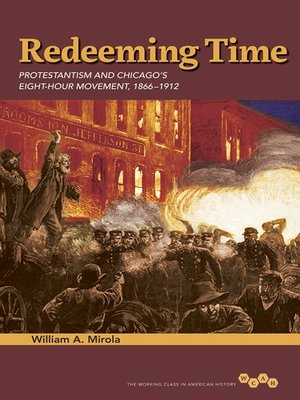Redeeming Time
ebook ∣ Protestantism and Chicago's Eight-Hour Movement, 1866-1912 · Working Class in American History
By William A. Mirola

Sign up to save your library
With an OverDrive account, you can save your favorite libraries for at-a-glance information about availability. Find out more about OverDrive accounts.
Find this title in Libby, the library reading app by OverDrive.



Search for a digital library with this title
Title found at these libraries:
| Library Name | Distance |
|---|---|
| Loading... |
During the struggle for the eight-hour workday and a shorter workweek, Chicago emerged as an important battleground for workers in "the entire civilized world" to redeem time from the workplace in order to devote it to education, civic duty, health, family, and leisure.
William A. Mirola explores how the city's eight-hour movement intersected with a Protestant religious culture that supported long hours to keep workers from idleness, intemperance, and secular leisure activities. Analyzing how both workers and clergy rewove working-class religious cultures and ideologies into strategic and rhetorical frames, Mirola shows how every faith-based appeal contested whose religious meanings would define labor conditions and conflicts. As he notes, the ongoing worker-employer tension transformed both how clergy spoke about the eight-hour movement and what they were willing to do, until intensified worker protest and employer intransigence spurred Protestant clergy to support the eight-hour movement even as political and economic arguments eclipsed religious framing.
A revealing study of an era and a movement, Redeeming Time illustrates the potential—and the limitations—of religious culture and religious leaders as forces in industrial reform.| Cover Title page Contents Preface Introduction: Protestantism and Labor Reform Movements 1. A City of Industrial and Religious Extremes 2. Opening Eight-Hour Protests and the 1867 Eight-Hour Law 3. Eight Hours and the Financial Crisis of 1873 4. Marching to Haymarket and the 1886 Eight-Hour Campaign 5. A "New Consciousness" for Contructing a Morality of Leisure 6. Shifting Eight-Hour Reform from Consciousness to Creed in the Twentieth Century Conclusion: Religion and the Trajectory of Labor Reform Movements Notes References Index | "Mirola is able to articulate a nuanced, almost dialectical appreciation for the relationship between religion and social movements even when the churches and the labor movement activists were nearly always moving in opposite directions."—Middle West Review
"Mirola offers a clearly argued and well-researched piece of scholarship. . . . Valuable for understanding turn-of-the-century Chicago."—H-Net Reviews
"A careful examination of alliance-building between labor activists and Protestant clergy... Mirola does a fine job of keeping the perspectives of workers, clergy, and industrialists all in the mix—a balancing act that makes the book far more than a case study of the Social Gospel Movement."—American Historical Review
|William A. Mirola is a professor of sociology at Marian University in Indianapolis. He is the coauthor of Religion Matters: What Sociology Teaches Us about Religion in Our World.
William A. Mirola explores how the city's eight-hour movement intersected with a Protestant religious culture that supported long hours to keep workers from idleness, intemperance, and secular leisure activities. Analyzing how both workers and clergy rewove working-class religious cultures and ideologies into strategic and rhetorical frames, Mirola shows how every faith-based appeal contested whose religious meanings would define labor conditions and conflicts. As he notes, the ongoing worker-employer tension transformed both how clergy spoke about the eight-hour movement and what they were willing to do, until intensified worker protest and employer intransigence spurred Protestant clergy to support the eight-hour movement even as political and economic arguments eclipsed religious framing.
A revealing study of an era and a movement, Redeeming Time illustrates the potential—and the limitations—of religious culture and religious leaders as forces in industrial reform.| Cover Title page Contents Preface Introduction: Protestantism and Labor Reform Movements 1. A City of Industrial and Religious Extremes 2. Opening Eight-Hour Protests and the 1867 Eight-Hour Law 3. Eight Hours and the Financial Crisis of 1873 4. Marching to Haymarket and the 1886 Eight-Hour Campaign 5. A "New Consciousness" for Contructing a Morality of Leisure 6. Shifting Eight-Hour Reform from Consciousness to Creed in the Twentieth Century Conclusion: Religion and the Trajectory of Labor Reform Movements Notes References Index | "Mirola is able to articulate a nuanced, almost dialectical appreciation for the relationship between religion and social movements even when the churches and the labor movement activists were nearly always moving in opposite directions."—Middle West Review
"Mirola offers a clearly argued and well-researched piece of scholarship. . . . Valuable for understanding turn-of-the-century Chicago."—H-Net Reviews
"A careful examination of alliance-building between labor activists and Protestant clergy... Mirola does a fine job of keeping the perspectives of workers, clergy, and industrialists all in the mix—a balancing act that makes the book far more than a case study of the Social Gospel Movement."—American Historical Review
|William A. Mirola is a professor of sociology at Marian University in Indianapolis. He is the coauthor of Religion Matters: What Sociology Teaches Us about Religion in Our World.







